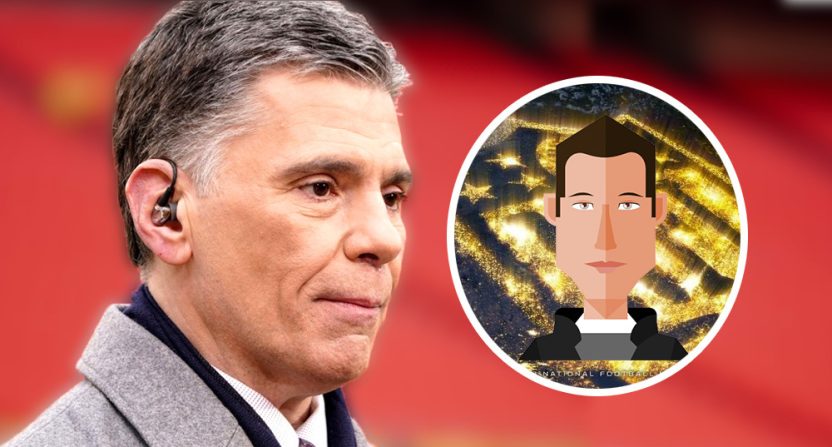Last week saw two prominent NFL media figures both getting some pushback.
A report from Pro Football Talk’s Mike Florio that he was getting “very credible indications that Kirk Cousins is planning a potential move of his family from Minnesota to Atlanta” (which was eventually proven right Monday when Cousins went to the Falcons) led to some critics questioning Florio’s sourcing. That saw Florio push back with “You realize I’ve been doing this 23 years, right?”
Meanwhile, Dov Kleiman put out a tweet combining two quotes from former NFL executive turned podcaster Michael Lombardi on Antonio Pierce. That led to Lombardi saying he’d “fight back” against Kleiman. It also led to Lombardi questioning Kleiman’s identity, saying, “Who is he, anyway, some strange cat somewhere in a basement in Israel?”
There’s an interesting connection between those stories. While the two figures are rather different, especially in where they’re at today and in what they do today, some current reactions to Kleiman and other Twitter aggregators bring back memories of how many traditional media members initially reacted to Florio and other bloggers. And that’s worth some deeper consideration.
Really, the discourse about Kleiman’s identity (which started well before Lombardi but came back into focus with him) and the suggestion that that invalidates him as a source of NFL news is not that dissimilar to the discourse decades ago when Florio burst on the NFL scene. Florio did that with his own combination of reporting and aggregation, first at independent NFLtalk.com in 2000, then at ESPN after they bought that out, then at independent Pro Football Talk beginning in 2001, and then at Pro Football Talk once NBC bought the exclusive rights to license its content in 2009. And he took a lot of criticism early on, including for his perceived outsider status, but also for some of his content decisions.
The outsider status discussion was not limited to Florio or to the NFL, of course. This came up particularly intensely in baseball in the early 2000s around the 2003 publication of Michael Lewis’ Moneyball, with that intensifying already-ongoing discussion of advanced statistics. Much of that discussion took place on independent blogs, which were also taking off at that time, and it got pushed back on with a lot of “They haven’t played the game.”
Particularly notable examples of that came from then-ESPN commentator Joe Morgan. That led to the name of the 2005-2008 Fire Joe Morgan blog, written by three TV writers who would go on to make some incredibly notable shows (and sometimes work David Eckstein jokes into those). That blog went well beyond just criticizing Morgan, though, as the pushback against outsiders came from many print media figures and broadcasters. And that went well beyond baseball; there were significant backlashes against blogs and bloggers across sports.
Let’s pause for a moment to define a blog. It was coined in 1999 as the shortened version of “weblog,” a term itself coined in 1997. The term was initially used mostly for personal journal-style websites, but many more topic-focused sites soon popped up. In sports, in particular, “blog” and “blogger” were useful umbrella terms (and terms often embraced beyond their use as criticism) for categories of people writing for digital-only, primarily independent sites, mostly without access.
Not long after Moneyball, that all got muddied quickly. Outsider efforts grew bigger (SB Nation was founded out of Athletics Nation in 2003, Deadspin was launched out of Gawker in 2005), more traditional companies bought or started blogs (Yahoo launched the Yahoo Sports Blogs in 2006, NBC acquired Pro Football Talk in 2009), and teams and leagues began granting more access to bloggers, both truly independent ones and ones with more backing. And categorization debates intensified around what was and wasn’t a blog. And some of those debates still exist today.
But for our purposes, concerning Florio, he certainly drew lots of “blogger” criticism before NBC brought PFT into the fold. (He sometimes used the term himself to criticize others who didn’t find him to be a “real” blogger over things like not allowing comments.) And he drew some after that acquisition as well. And while general “blogger” criticism was on its way out in 2012, and even more so in 2015, the people lobbing those kinds of remarks probably still would have included him. So, with all that said, it’s fascinating that we’re now at a point where Florio is defending his insider status and connections and how long he’s had them, while others are criticizing Kleiman specifically over his outsider status and identity rather than his content.
Of course, the approaches from Florio and Kleiman are not entirely equivalent. First, Florio does not just aggregate; he also provides his own reporting, as with the Cousins piece that led to his pushback here. When he does aggregate news, it mostly comes in articles longer than tweets, often including some of his own analysis or commentary. Yes, his Twitter activity and comments there have often drawn attention, too. However, his main focus is articles and the website (and, more recently, his NBC/Peacock TV roles).
By contrast, much of Klieman’s focus has been specifically on presenting aggregated NFL news on Twitter/X. At the same time, he has written articles, including for BroBible through last November, that haven’t been where he’s spent the most time or drawn the most notice.
That’s also a valid way to approach media. Arguments can be made that NFL insiders like ESPN’s Adam Schefter and NFLN’s Ian Rapoport often also prioritize Twitter more than articles or TV. There are certainly many followers who appreciate Kleiman’s quick relaying of NFL news and perspectives from a wide variety of sources. His account would not have those 268,000-plus followers if people weren’t finding value in it.
However, a Twitter-focused approach is different from a website-focused one. One is that most of Kleiman’s information relaying doesn’t seem to come with particular added analysis or commentary (at least in the initial tweet relaying the information).
That can be fine for people who want “just the facts” or “just the takes.” And it doesn’t validate Kleiman as a source of (relayed) news. But it does differentiate him from those who write website-length commentary on news. (Conversely, it also should be noted that not all NFL aggregator accounts are the same, and Kleiman, in particular, has taken umbrage at being lumped in with other accounts he doesn’t feel provide the same standards he does.)
The larger point here, though, and what ties this back to Florio and the early days of blogging, is that many critics of Kleiman miss the mark by focusing on form rather than function. His identity and location are not the point (especially after he dispelled some of the wilder conspiracy theories about him).
The content’s the point.
The latest
- Could NFL see next Saudi sportswashing controversy?
- ESPN and NBA have reportedly ‘essentially come to terms’ on deal that would keep Finals on ABC
- G/O Media sells The Onion to ‘Global Tetrahedron,’ ex-NBC reporter Ben Collins to serve as CEO
- Eli Gold on Alabama exit: ‘You can’t argue with city hall.’
There’s absolutely room for criticism of how Kleiman and other aggregators present news or how Florio and others report or discuss news. But the criticism should be focused on what they do, not who these people are or what outlet they do or don’t work for. (And, on that front, while Florio’s “I’ve been doing this for 23 years” and discussion of the on-air and off-air interviews he does has plenty of merit as to why to believe a report from him, his work history doesn’t absolve him if a report winds up being wrong, and he does still get criticism for some of his content.)
Beyond that, it’s interesting how the times change and how the same lines of argument come back in different forms. Most of the thoughtful criticisms of Florio at the moment are not going to include “You’re an outsider with no sources.” As Florio’s response there indicates, he very obviously has a lot of conversations with and connections to league figures at the moment. And yes, he does do some things differently than some other more conventional figures, but he’s hardly seen with the outsider lens many used to view him through. But some of that’s now transferred to people like Kleiman, who appear to be more actual outsiders now.
Being an outsider is not necessarily bad, especially if you’re not explicitly looking to break the news yourself. And Kleiman’s approach seems to be working just fine for him. But it’s amusing to see some of the old anti-blogger “outsider” arguments resurface around aggregators like Kleiman over a decade after much of the discourse about bloggers ended.
And it will be really amusing if we see people like Kleiman with connected and established insider status a decade from now, and the “outsider” slams move on to a whole new category of people. That won’t necessarily happen, of course, with Kleiman or with any of the other current Twitter aggregators. But it’s not impossible that the change in perception from outsider to connected establishment figure that we saw with Florio could be repeated with one of today’s outsiders.







